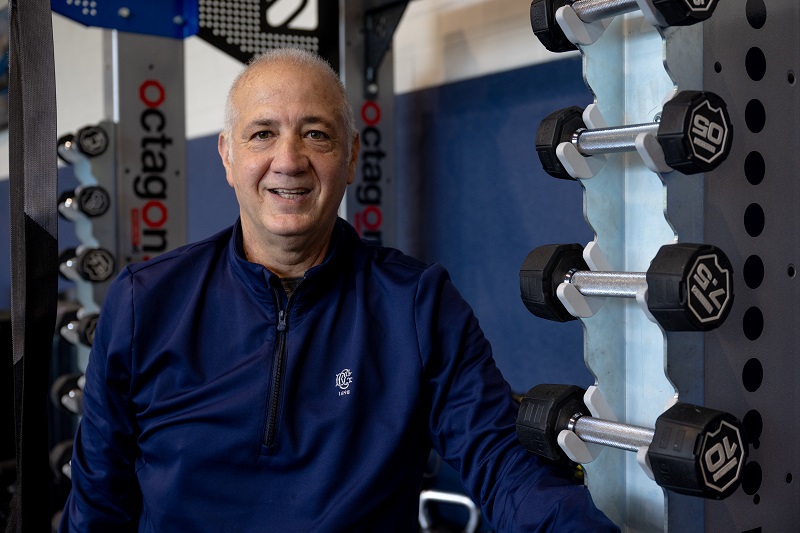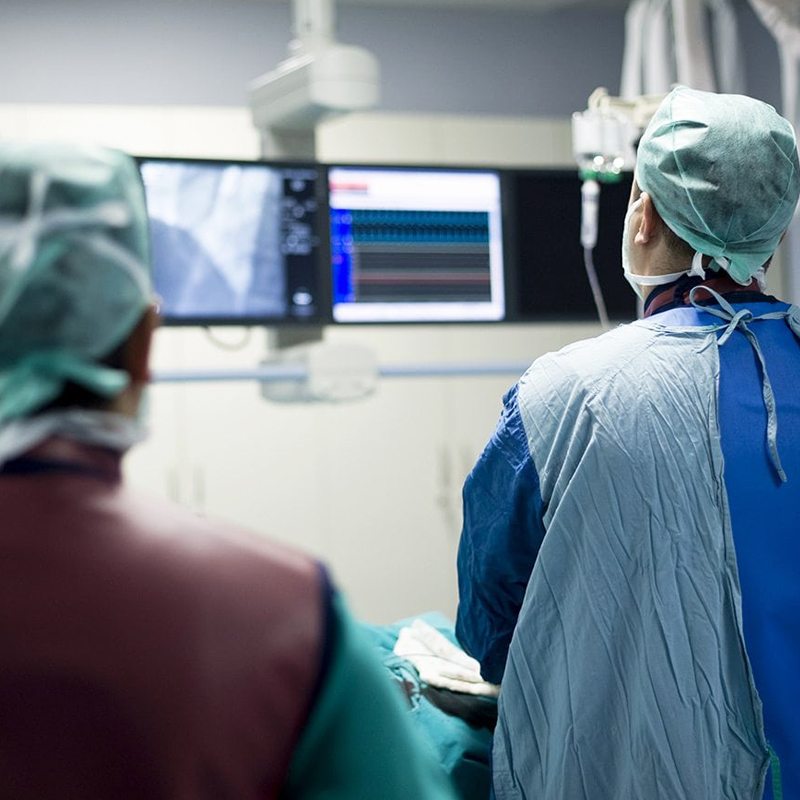62-year-old Survives Heart Attack and Complete Artery Blockage

May 28, 2024
After a long day of working with his consulting clients in New York City, Anthony Lucia, 62, of Deal, NJ, got into bed around midnight on July 18, 2023. Suddenly, he called out to his wife, Jacqlene, in alarm. He felt like he was being “electrocuted in his heart.”
His wife thought it might just be heartburn, but he didn’t think so. “Put on your smart watch,” she told him, and when he did, it “went crazy.” She told him to get dressed to go to Jersey Shore University Medical Center, just a couple miles away from their home.
When they got to Jersey Shore, Jacqlene dropped Anthony off at the door to the Emergency Department. He walked in, told the person at reception that he was having chest pain and then died on the spot.
“He dropped dead,” says Daniel Kiss, M.D., the cardiac interventionist who cleared the 100% blockage of Anthony’s right coronary artery. “When the heart artery gets completely blocked up and someone has a heart attack, the heart muscle becomes so irritated from lack of oxygen that it develops fatal electrical rhythms.”
This type of heart attack is called an ST-elevation myocardial infarction (STEMI), and in Anthony’s case, it led to a cascade of medical emergencies.
Heart Attack Leads to Multitude of Other Problems
It took the medical team 30 minutes—and eight defibrillations—to bring Anthony back to life. Once he was stabilized, Anthony was rushed to the cardiac catheterization lab, where a team specially trained for STEMI heart attacks was waiting for him.
In less than 20 minutes, Dr. Kiss opened Anthony’s blocked artery and restored blood flow to his heart. His heart wasn’t damaged, but he wasn’t out of the clear just yet. “We rapidly opened the artery, which was very successful, but then we had to deal with his circulatory and respiratory collapse,” says Dr. Kiss. “Anthony’s heart was stunned, and he was so sick that his heart was not pumping enough blood to meet the needs of his body and maintain a blood pressure.”
Dr. Kiss and his team inserted an Impella®, a tiny implantable heart pump, which immediately improved Anthony’s blood pressure. But he was still not getting enough oxygen in his lungs.
Anthony was transferred to the cardiac ICU, where Brook DeJene, M.D., a cardiothoracic surgeon, hooked him up to an advanced life support device called an extracorporeal membrane oxygenation (ECMO) machine. Similar to a heart-lung machine, the ECMO pumps and oxygenates blood outside the body. It does the work so the heart can rest and heal.
Being on the ECMO and in a medically-induced coma helped Anthony’s lungs slowly recover. When he came out of the coma, over two weeks had passed, and he was on dialysis because his kidneys had failed. He’d lost so much muscle mass lying in bed that he couldn’t walk.
Healthy Living Saves Lives
“It’s truly a miracle he’s alive. At one point, he was most likely the sickest patient in any New Jersey hospital,” Dr. Kiss says. “He’s the 0.1 percent of people who actually survive something like this. Healthy people can withstand a lot. If he wasn’t so fit coming into it, there’s no chance he would’ve survived.”
For years, Anthony had been eating a healthy diet and keeping active—walking 8 to 10 miles a day—and had been getting nuclear stress tests because of his family history of high cholesterol and heart disease.
However, during the early days of the COVID-19 pandemic, a scheduled nuclear stress test was canceled and he never got around to rescheduling it. About two weeks prior to his heart attack, Anthony felt unusually tired, and it crossed his mind that he needed to schedule a stress test.
A month after his near-fatal heart attack, Anthony went to the Johnson Rehabilitation Institute at Riverview Medical Center for an expected two-month inpatient stay, but he was out in two weeks. Determined to get home to his wife and dogs, the day after he was admitted, he was moving with a walker. “By the fourth day, I was taking steps by myself,” he says.
Today, less than a year since he “died” in the Emergency Department, Anthony feels good but still gets winded if he tries to run. The treatment I got was just amazing,” he says. “They were so attentive and made me feel like I was special. They truly saved my life.”
Next Steps & Resources
- Meet our sources: Daniel Kiss, M.D. and Brook DeJene, M.D.
- Understand your risk for heart attack with a simple screening like AngioScreen or CT Calcium Scoring scan.
- Learn how Jersey Shore University Medical Center is investing in the health of our community through a $45 million investment in a brand-new cardiovascular suite.
- To make an appointment with a cardiologist near you, call 800-822-8905 or visit our website.
- Learn more about heart care at Hackensack Meridian Health.
The material provided through HealthU is intended to be used as general information only and should not replace the advice of your physician. Always consult your physician for individual care.






